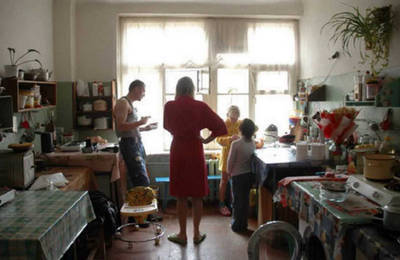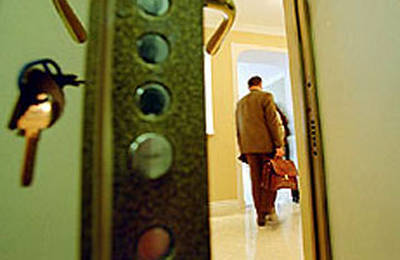Former spouses, as well as the majority of those who received housing as a gift, inheritance or through privatization - all this is a multimillion-dollar army of “co-owners” who own shares in apartments.
It is the properties that are in shared ownership that account for the lion's share of housing conflicts, which cannot even be resolved by going to court. But extrajudicial mechanisms offer as many as four ways to remove owners from the conflict while respecting the interests of all its participants.
This works even in cases where the dispute has reached a stage where the parties are no longer capable of peaceful negotiations.
Natalya Mikhailyukova, a lawyer for the Russian Guild of Realtors, admitted that every day people living in apartments that are in shared ownership come to her for consultations. The main question is what to do if other co-owners want to move into this apartment, sell their share, or otherwise claim their rights.
Currently in Yekaterinburg, only about fifty individual shares in apartments are sold through real estate agencies.
In total, there are much more such objects on the market, but they are sold privately or through black realtors, without the involvement of reputable agencies.
This happens due to the fact that professional market participants are extremely reluctant to work with individual property shares.
director of the office of the Academy of Sciences "Novosel" If a share in the ownership of an apartment is put up for free sale, this almost certainly means that there is a conflict between the co-owners, and they are no longer able to resolve the situation peacefully, even if this path will allow the co-owners to receive greater benefits. Selling a separate share in an apartment to a third party is always a loss of money - about 30% of the value of the property. That is, half of the apartment worth 2 million will be sold not for a million, but for 700 thousand. And even in this case, the chance of selling is one in ten. If a client comes to the agency selling a separate share, the realtor understands that if he undertakes to sell it, he will find himself in an extremely unpleasant situation. The only way for a realtor to help such a client and save his face is to become a mediator - an intermediary between the co-owners and try to resolve the situation in the interests of all owners, leaving out all personal relationships of the participants.
Selling a share of an apartment “outside” is not only a losing option in terms of money, but is also fraught with further escalation of the conflict due to the inclusion of a new owner of the share.
At the same time, there are four peaceful (and economically feasible) ways to resolve the problem share situation.
Of course, the owners of problematic properties know or at least guess about the existence of these methods, but do not always understand how to implement them in real life, especially in conditions of conflict between co-owners.
Method 1. Sell the entire apartment
If the owners sell the entire “shared” apartment, they will receive the full price for it. And it will be possible to divide it in proportion to shares. After which everyone buys a home with their own money or uses it in some other way. The scheme can be effective even if initially there is only a one-room apartment in shared ownership.
director of the office of the Academy of Sciences "Novosel" The man left behind a one-room apartment, purchased outside of marriage. It was claimed by the wife (now a widow) and the child from the testator’s first marriage. Accordingly, everyone was entitled to one second share in the property. The heirs were unable to come to a common decision. One of the co-owners tried to sell his share, but was unable to. As a result, no one lived in the apartment and it was even impossible to rent it out. The child's mother (the testator's ex-wife) contacted a realtor. He found two rooms in communal apartments, the total cost of which was equal to the market value of the disputed apartment. The parties were satisfied with this version of the “exchange”. The apartment was sold, the heirs received a room in return for their shares, and are now renting them out.
Method 2. One of the co-owners sells a share to another
From a logistics point of view, selling a share “among your own” is the simplest option: you don’t have to look for a buyer, and you don’t have to notify all co-owners of your desire to sell your share.
That is, if a share is sold externally, the seller is obliged to offer to buy out this share to other co-owners (more on this below).
If the owner of the share sells it to one of the co-owners, then the sale does not need to be coordinated with anyone, even if other people also own the apartment.
Separately, it is worth considering the issue of determining the price of the share being sold. As Vlada Pavlova, a real estate specialist at the Link Academy of Sciences, notes, when buying and selling shares between co-owners there is always an interested party. It is it that is forced to agree to the terms of the other party to the transaction.
For example, recently the owner of four shares in an apartment worth 3 million rubles bought the fifth share for 1 million rubles, that is, he overpaid by more than one and a half times. Often the opposite situation arises - the owner of a small share, in order to get at least something for it, gives away the share for next to nothing.
It happens that for a tenth of the real price.
However, often the most difficult thing in an internal sale is not determining the price, but the fundamental ability to negotiate.
real estate specialist at Link Academy of Sciences Case from practice. The apartment is privatized for three – father, mother and child. The parents divorced, the father left the apartment and ended all relations with his ex-wife. Her attempts to buy out her husband’s share did not end in anything. This lasted 8 years! As a result, the woman turned to a realtor. He sent the man a letter: “The wife wants to buy out your share, if you are interested, contact me.” The person agreed to communicate with the realtor. The deal was drawn up so that the former spouses would not meet in person. Since the last share in the apartment was being purchased, the bank agreed to provide a mortgage loan for it. So, even in the bank, when completing the transaction, the ex-spouses - the seller and the buyer - were in different rooms. Nevertheless, the purchase and sale was formalized. I note that the woman was able to buy out the share even without having enough money - with the help of a mortgage.
By the way, if the owner of a small share refuses to sell it to other co-owners, then theoretically it is possible to force him to do so. From Art.
252 of the Civil Code of the Russian Federation it follows that if the owner’s share is insignificant and he does not live in the apartment, then even without his consent the court can order the other co-owners to pay him the cost of the share and take this share for themselves.
The same is stated in the Ruling of the Supreme Court of the Russian Federation N 56-В06-17 dated 10.24.06. However, in practice, “forcible” buyout of a share is practically never used.
Method 3. Agree on sharing an apartment
Participants in shared ownership can establish the procedure for using shares among themselves. This, by the way, is the most common scheme. However, in reality it works if there are at least as many rooms in the apartment as there are parties wanting to live in it.
If the apartment, for example, is one-room, then either the court gets involved in resolving the conflict, or the co-owners find non-trivial solutions. For example, a shared apartment can be rented out and the income received can be divided in proportion to shares.
Or here’s another option - the co-owners agree to live in the apartment in turns, each for, for example, a year.
lawyer of the Ural Chamber of Real Estate If dialogue between co-owners does not work out, then you should go to court. He will determine the procedure for using the area, taking into account the real situation of each owner. The calculation will take into account whether each of the co-owners has a different living space, children, dependents, financial situation, etc. If the apartment is one-room, then a decision may be made that the owner of a smaller share with many children who has no other housing has the right to live in it, and the owner of a larger share of the disputed apartment will be “asked” on the basis that he owns other living space.
Lawyers recall cases when the court evicted a co-owner living in it from an apartment and moved in another co-owner. However, if we are talking about an apartment with two or more rooms, then usually the court transfers the rooms to the co-owners for use, focusing on the size of the rooms and shares in the property.
Method 4. Rent a share from a co-owner
This option is a variation of method No. 3. Here the parties also need to agree on joint use. But in the end, the co-owners play different roles.
lawyer of the Russian Guild of Realtors If an apartment does not allow all co-owners to use it, then it happens that they agree like this - one co-owner lives in the apartment and gives the other something like rent, calculated based on the size of the shares.
Theoretically, there is also a fifth way to solve the situation with a problematic share, but in practice it is suitable (sometimes) only for private houses, but not for apartments. We are talking about allocating a share in kind.
By mutual agreement or by court decision, housing can be physically divided between co-owners. Everyone will receive a part of it for use. But each such part should have not only a living room, but also a kitchen, a bathroom and a separate entrance.
It is impossible to organize several entrances, kitchens and bathrooms in a separate apartment. Sometimes this can be done in a private home.
What should a rejected co-owner do (three options for solving the problem)
If the owners of the shares were unable to come to a common decision, then the story can develop according to one of three scenarios, and in all of them the co-owner living in the apartment continues to live in it, but the actions of the expelled co-owner may be different. He can “spit and forget”, or move in through the court (described in method 3), or transfer his share to the party. People are reluctant to buy shares of apartments, however, there is some demand for them.
managing partner of the company “BK_NEDVIZHIMOST” A person buys a share in an apartment in three cases. Someone buys a share for their residence. He hopes that he will be able to agree with other co-owners on joint use of housing. This is a rather risky option, but sometimes it is done. The second case is when a share is purchased to obtain permanent registration. The share may be small, for example, one hundredth of an apartment. And finally, there are professional raiders. They buy shares in the apartment in order to impose their conditions on the old co-owner - most often to force them to sell the shares.
As realtors note, if a person is ready to buy part of an apartment specifically for living, then it would be more correct to buy not a share in the apartment, but a room in a communal apartment or dormitory. In this case, the rights of residents are more clearly defined.
However, there are examples where share buyers coexist quite peacefully with their flatmates.
However, there are also examples of a different kind - namely, when a share in an apartment is purchased with the aim of bringing the intensity of passions to the limit and making a profit from it, or simply buying the share of the unfortunate co-owner on the cheap.
lawyer of the Russian Guild of Realtors Some time ago in Yekaterinburg, a man who purposefully oppressed his co-owners in an apartment received a real prison sentence. He became rowdy, smeared creosote on the doors, and even became physically violent. But I’ll say right away that this case is rather an exception. It is very difficult to find justice for an aggressive co-owner. In the case described, the case went to court because the man had shares in several apartments and in all of them he tried to survive his neighbors. Moreover, these were not only grandparents, but also quite socially adapted people. They managed to contact each other and contacted the prosecutor's office. The court took into account that the rowdy had shares in different apartments, and he deliberately did not consolidate them - he did not change them into one apartment.
1. Sell
Previously, the METRTV.ru portal spoke in detail about the rules of conduct for owners of apartment shares, and also described the intricacies of the procedure for selling a share in ownership. Sales practices have changed a bit lately. Selling a share has become easier.
real estate specialist at AN “Link” According to the law, a co-owner who sells a share “outside” is obliged to offer to buy it to other co-owners of the apartment. Other co-owners, if they are not ready to buy out the share, write a refusal to purchase. If they are far away or do not make contact, you can send them telegrams with an offer to sell. Then the co-owners will not be able to later declare that their right to buy out the share has been violated and cancel the deal through the court. Previously, the practice was that telegrams had to be sent to the registration addresses of co-owners. These addresses may not be known to the person selling the share. Now it is enough to send telegrams to the address of the apartment in which the share is for sale. The court today reasons like this: if you have property, then you must take care of it, at least check the mail.
You can place an advertisement for the sale of a share in an apartment in the “apartment sales” section of the METRTV.ru portal. It is important not to forget to indicate the size of the share being sold in the appropriate field.
2. Give
Often, a gift agreement is used to alienate a share in an apartment. In this case, the consent of the co-owners is not required. If a sale was disguised as a donation, then the transaction can be challenged in court, but in practice it is almost impossible to prove that it was a sale and not a donation.
director of the office of the Academy of Sciences "Novosel" A relatively recent case: a woman with a child and her brother, the owner of one third of the property, lived in the apartment. Without informing his relatives, he transferred his share through a gift deed. The woman tried to challenge the deal in the Ordzhonikidze court, but there the deal was not recognized as a sham. The judge demanded evidence of the transfer of money. Of course, there was no evidence.
However, even if the court found the transaction carried out through a donation to be feigned, this does not mean that the share will be taken away from the new owner. The court will transfer the buyer's rights to the co-owner who challenged the transaction, but if the co-owner does not buy out this share, it will remain with the “third-party” owner.
3. Pay for debts
And finally, the third way to alienate shared property is through a compensation agreement. The owner of the share enters into a loan agreement with the buyer for the amount for which he plans to sell the share.
A share is issued as collateral for the loan.
After registering the collateral with Rosreestr and the owner receiving money from the lender (buyer), a compensation agreement is drawn up, according to which the lender forgives the debt and receives the collateral in return - that is, a share of the apartment.
lawyer of the Russian Guild of Realtors Shares in apartments are now rarely alienated through compensation. It’s easier to do this through regular purchase and sale. However, transactions with parking spaces are often carried out according to this scheme. Such a place is a share in the ownership of the entire parking lot. And all co-owners must be sent an offer to purchase a share. There was a case where a person selling a parking space sent out 255 telegrams, and it turned out that 8 co-owners live in countries with which there is no telegraph communication. As a result, the deal was carried out through a loan agreement and compensation.
Don't forget about the notary
On June 2, 2016, a law came into force in Russia that prohibits the gift, exchange, purchase and sale of shares in real estate, as well as entire objects that are in shared ownership without a notary.
This means that the purchase and sale agreement (exchange, gift) of a share of the apartment must be certified by a notary. Without this assurance, Rosreestr will not register the transaction. Notarization of an apartment purchase and sale agreement costs 0.5% of the cost of the property plus 4.9 thousand for “technical work”.
The maximum cost of notarization of a contract should not exceed 25 thousand rubles.
Sometimes you can hear that notarization is required only when selling a share “outside”. Actually this is not true. Although the first edition of the “notarial” law mentioned above did indeed envisage such an option, during the discussion the State Duma tightened the rules, and all transactions with shares became notarized.
Previously on the topic:
- Rules of good behavior for apartment share owners
Useful services:
- Catalog of new buildings in Ekaterinburg
- Apartments for sale in Ekaterinburg
comments powered by HyperComments
Do you know how to register a share in an apartment for your child?
In Russia, more than half of housing is in shared ownership. A share in an apartment is not a specific room or square meters, it is some part of the right to own housing on an equal basis with other co-owners . And owning a share is not like owning an apartment. Of course, you can dispose of your part of the housing in any way you like, but there are certain rules fixed by law . And in order not to spend the family budget on transactions that may well be considered illegal, the rules for transactions with shares must be followed.
According to Article 244 of the Civil Code, property can be either shared or joint.
Joint ownership is when shares in an apartment are not designated in any way . For example, if housing is purchased by spouses, but is registered in the name of one of them, this does not mean that he is the owner of the apartment. By default, it is joint property between husband and wife. During a divorce and division of property, the judge will divide the apartment equally, but may deviate from equality of shares if:
- the child remains with one of the parents;
- one of the spouses invested a large part in the apartment (for example, sold pre-marital property).
Shared ownership is the ownership of an apartment divided into shares . Such property may appear for various reasons, for example:
- the apartment was inherited by several heirs;
- purchased or accepted as a gift by several people;
- separated by spouses.
In this case, the shares are always indicated in the apartment certificate, for example, ½, 1/3, etc.
Attention! A fractional number is not at all a proportional number of square meters, as many people think, it is part of the right to own an apartment .
For example, the owner of a 1/3 share of a sixty-meter apartment does not have the right to fence off 20 meters and settle there.
Who can live in which room can only be determined in two ways:
- agree among themselves;
- ask the court to decide the procedure for using the living space.
But even in the case of litigation, it is not always possible to determine the order of use of housing , for example, if a two-room apartment has three or more shareholders, the judge will not divide the rooms, he will simply refuse the claim due to impossibility. Therefore, in most cases, disputes about shares are resolved simply - by exchanging or selling the entire apartment .
How can you dispose of your share?
According to Article 244 of the Civil Code, your part of the apartment can be:
- sell or donate;
- bequeath;
- lay down
However, since this is still a share, and not the entire apartment, it will not be possible to sell it without demand. Article 250 of the Civil Code established the advantage of co-participants in purchasing a share upon its sale.
For example, if you are going to sell your share, you must first offer to buy it from you to the other co-owners of the apartment at the announced price .
Moreover, the offer must be written, for example, in a registered letter with notification.
Please note: You can give, bequeath or pledge your share without asking .
If you are faced with the question of whether to sell or donate a share , you need to consider several nuances:
- if you own the share for less than 3 years, you will need to pay 13% tax on the sale;
- when making a gift, the donee will pay the tax (close relatives - children, parents, spouse - do not pay tax);
- a gifted share will not be divided between spouses during a divorce , unlike a sold one (this means the case when the owner of the share alienates it in favor of his child, who is already married).
But before disposing of a share that is not defined (joint property), it must first be determined .
How to register a share in an apartment
As already explained, the share can be determined either by agreement or in court.
This is required by Article 244 of the Civil Code .
If all co-owners of a common apartment decide to amicably determine their shares, you need to do this:
- draw up a written agreement on the determination of shares;
- register it with Rosreestr.
Previously, all real estate transactions were notarized, but now this is not required. But it's not prohibited either.
And if there is no agreement among the partners, only the judge has the right to determine the shares . By default, shares in a common apartment are equal. But an increase in someone’s favor is also possible if:
- money was not invested equally in purchase or construction;
- one of the co-owners improved the condition of the apartment at his own expense (for example, installed water supply).
In this case, in Rosreestr the main document will not be an agreement, but a court decision.
Donation of a share in an apartment
This is the most profitable deal between close relatives. to notify other shareholders about the gift, and relatives do not pay gift tax . Donation occurs in two steps:
- a deed of gift is drawn up;
- registered in Rosreestr.
The agreement for the donation of a share, that is, a deed of gift, is drawn up quite simply - it describes who is giving what to whom . The contract describes not the share, but the entire apartment, but the size of the share is indicated. The deed of gift form can be downloaded here .
After the deed of gift has been drawn up, it must be registered with Rosreestr . You can come to both the Rosreestr office and the MFC. In addition to the deed of gift, you need to take the passports of the donor and the donee and a certificate of share.
Relinquishment of a share in an apartment in the event of a gift is possible at any time . Only the donee can refuse without reasons, while the donor, having signed the deed of gift, can refuse only if his financial situation has worsened and donating a share will deprive him of his last home.
The deed of gift can subsequently be canceled if the donee encroaches on the life or health of the donor. But this must be a court decision, supported by a verdict .
Refusal is also possible when it is decided to privatize the apartment.
If you have not yet privatized an apartment , then it is worth reading here .
If the apartment has not yet been privatized, but the decision to re-register has already been made, the housing is divided in equal parts among everyone who is registered in the apartment . As is known, adults can participate in privatization only once.
Sometimes adult children wonder how to give up a share in an apartment in favor of their parents. Such questions are not uncommon if, for example, it is possible to obtain a service apartment under a military certificate or under the Housing program. There are two options for the development of events:
- you can be discharged from your parental home before privatization;
- write a refusal of privatization from a notary.
In this case, the apartment transfer agreement will be drawn up only with the parents. But the situation is completely different if the child is a minor . Even if the guardianship council allows the child to be discharged to another home, the transaction may still be subsequently declared invalid. Therefore, it is better not to take risks and include the child in privatization.
Child's share in the apartment
Children are a specially protected segment of the population by the state . If a child has property in the form of a share of an apartment, the parents can dispose of it, but under the close supervision of the guardianship council. In this case, the share can only be sold and parents do not have the right to be buyers .
To sell a child’s share, the following conditions must be met:
- provide the child with other housing, which should not be smaller or worse;
- obtain written permission from the board of trustees for the sale.
There are situations when, before the sale, a child is given part of an apartment, for example, a grandmother’s apartment, and then they turn to the guardianship for permission. This approach is fundamentally wrong , because the child now has both a share in the grandmother’s apartment and in the one being sold. And in return for the sold share, you need to give something to the baby.
- Solution Before going to guardianship, you need to draw up a preliminary agreement of donation or purchase and sale of a share in favor of the child .
- And after the guardianship gives permission for the sale, you can draw up a basic agreement, according to which the share in the apartment will become the property of the child instead of what was sold.
- But keep in mind that guardianship may prohibit the sale if :
- the purchased share has worse technical characteristics compared to the sold one (for example, there is no running water);
- the new apartment is located in a worse area than the existing one (for example, on the outskirts, away from the school);
- housing has not yet been built (cooperative).
What can you do with a share in the ownership of an apartment?
Owners of shares in the ownership of an apartment can make any transaction with their share that is not prohibited by current legislation:
- Sell;
- Give;
- Transfer under an annuity agreement;
- Bequeath;
- Rent out, etc.
- However, for some transactions, the owner of the share will be required to take certain actions necessary to ensure that these transactions are not subsequently challenged in court by the owners of other shares in this apartment.
- So, if the owner of a share plans to rent out an apartment, then written consent will need to be obtained from the owners of other shares in this apartment, or in the form of a separate document with the content “the owner Ivanov does not object to renting out the apartment to citizen Petrov on such and such terms” , or in the form of a mark on the approval of the lease agreement with other apartment owners on the text of the agreement itself with their signatures and transcripts of the signatures.
- If we are talking about the sale of a share in the ownership of an apartment to some outsider, then the seller of the share is obliged to exercise the pre-emptive right to purchase his share by other owners of this apartment in full compliance with the requirements of the law, namely: the seller of the share is obliged one month before the sale of his share in writing to notify other apartment owners of his intention, indicating in the written notice the exact price at which he plans to sell his share to anyone.
- Other apartment owners must respond to the seller within a month either with written consent to purchase his share at the proposed price, or with a written refusal to complete such a transaction.
- If the owners of other shares of the apartment respond with a written refusal to purchase the share at the proposed price, or within one month from the date of sending the notice to them do not answer anything to the seller, which will be considered an actual refusal to complete the transaction, the owner of the alienated share will have the right to sell it to anyone who wants it .
- However, the price of the purchase and sale agreement will have to correspond exactly to the price indicated in the notice of sale to other apartment owners.
- If the price in the share purchase and sale agreement is at least one kopeck higher or lower than the price indicated in the notice, or if the seller of the share does not notify any of the apartment owners about his intention to sell his share, the other apartment owners will will have the right to file a claim in court to transfer the buyer’s rights to them.
- There are situations when conflicts arise among the owners of shares in a residential premises, making it difficult to live together in this residential premises.
- For example, relatives are not allowed into the apartment, they are not allowed to use a separate room, they create obstacles in moving in the family members of one of the owners of this apartment registered in the apartment, etc.
- There can only be three ways out of this situation:
- The first is the sale of a share to anyone;
- The second is determining the procedure for using residential premises;
- The third is the allocation of a share in kind.
Selling a share in the ownership of residential premises is a very dubious step in commercial terms. The new owner of the share risks facing the same problems that the seller of this share had.
Accordingly, the buyer of the share is aware of the upcoming battles for the right to move into the apartment and use at least some premises in such a problem apartment.
All this leads to the fact that the share is sold at a clearly reduced price, sometimes three to four times what it would cost if the procedure for using the apartment had been determined or the share had been allocated in kind.
A participant in shared ownership has the right to demand the allocation of his share from the common property. The allocation of a share in kind represents recognition of the right of private ownership of a separate isolated premises.
For example, a citizen was the owner of a share in a three-room apartment, and after allocating the share in kind, he can become the owner of a separate isolated room in this apartment.
However, not in all residential premises it is possible to compulsorily allocate a share in kind. The allocation of a share belonging to him to a participant in common property is permissible if it is technically possible to transfer to the plaintiff an isolated part of not only residential premises, but also utility rooms (kitchen, corridor, bathroom, etc.), and equipment for a separate entrance.
If this is not possible, the court has the right, at the request of the plaintiff, to determine the procedure for using the apartment.
Thus, forced through the court, the allocation of a share in kind is possible only in detached residential buildings, for example, a rural house or cottage, in which you can equip a separate entrance and make a partition that allows you to turn this residential building into actually a two- or multi-apartment residential building with separate isolated apartments.
Residents of city apartments have the following choice. The first is to either allocate the share in kind, that is, secure ownership of individual isolated rooms by concluding a voluntary agreement with the other owners of the apartment on the actual allocation of the share, or determine in court the procedure for using this apartment.
According to the law, ownership and use of property in shared ownership is carried out by agreement of all its participants, and if agreement is not reached, in the manner established by the court.
Determining the procedure for using a city apartment is quite possible in court. The main condition is that the rooms in this apartment be isolated, not adjacent. In this case, the court determines which of the apartment owners has the right to use which specific isolated room.
For example, the court may assign to the plaintiff Ivanov the right to use room No. 1, according to the floor plan of the apartment from the BTI, and to the defendants Petrov and Sidorov - the right to use rooms No. 2 and No. 3.
In the case of the allocation of a share in kind, in a separate house, Ivanov receives room No. 1 as private property, and in the case of determining the procedure for use in a city apartment, he is recognized with the right to use (right of residence) room No. 1.
In the first case, Ivanov can sell his home at the market price of a separate residential premises (separate room). In the second case, sell the share in the ownership of the apartment, based on the right to use a separate room secured in a court decision.
These are the common features in the distinction between common, common and private ownership of residential premises.
How to divide a house?
Any thing can belong under the right of common ownership to several citizens. This also applies to residential buildings, be it a luxury cottage or an old house in the village.
And often disputes arise between owners about the procedure for using the building or about the allocation of the appropriate share. If the owners of a particular property are several people, then such property is common property.
Common property can be shared or joint without defining shares. In order to sell or donate a share in an apartment where the ownership is joint, it must first be allocated.
In practice, there is an agreement for the simultaneous allocation of a share and a gift. When it comes to selling a share of common property, the person who is selling this share must be aware of the existence of the right of first refusal to purchase the share.
Its essence is that if you are going to sell your share to an outsider, then, first of all, you must offer to buy it to your co-owners.
They have the right of first refusal over a third party. You must notify them of the sale in writing (it is better to do this by notary).
- In this case, you must indicate the conditions under which the sale will take place, the price for which you intend to sell the share.
- If you have indicated an inflated price and the owners cannot purchase it at this price, then you cannot sell it to an outsider for a price lower than that indicated in the notarial offer.
- Otherwise, the co-owners will be able to sue the right of first refusal, or you will have to send them a second purchase offer indicating a different, more realistic value of your share.
- When the notice letter is received by a co-owner, then within 30 days from the date of receipt, the co-owner can buy your share.
If he did not buy it within this period, then you can safely sell it to a third party. The offer to sell your share must be sent by registered mail with notification.
If the co-owners cannot buy your share, then it is necessary that they formalize the refusal to purchase notarized. Then the seller of the share will be able to safely sell it without waiting 30 days.
This is an ideal scenario for the development of events. Most often, co-owners do not want to participate in the preparation of the sale, and sometimes even interfere with it. They avoid receiving notification of the sale.
Therefore, if you expect that the co-owners will prevent the sale, do not inform them about this, but send them a registered letter notifying them of your intentions.
If there are several people willing to buy your share, and all of them are your shareholders, then the right to choose a buyer belongs to you. Selling a share is a very difficult matter, and it is not easy to value it. Some shares are practically unsellable. Of course, everything has its price. The question is - which one? Will the seller be interested in it?
The share in the apartment is not physically designated in any way. It is expressed only in numbers in documents. The use of the sold share is determined by the court.
Therefore, when purchasing a share, the new owner must understand that the conditions for using it may change, since they will need to be established again through the court.
This is how many difficulties and not very pleasant procedures face those who want to dispose of their share in the common property. Property, including real estate, which is owned by two or more persons, belongs to them under the right of common ownership.
Common property occurs without the definition of shares in the right of joint ownership and with the definition of shares (shared ownership).
Thus, spouses are participants in joint ownership of property if they acquired it during marriage, unless otherwise provided by the marriage contract.
But they can convert joint ownership into shared ownership at any time. For example, if during marriage you bought an apartment and then divorced or for other reasons decided to divide it.
It is worth noting that the regime of joint ownership continues after the divorce, if the division of property has not been made.
A demand for separation can be filed within three years after the divorce. The division of property is carried out by agreement of the parties. And if an agreement could not be reached, then by a court decision.
Common property is divided only after a preliminary determination of the share of each of the participants in the joint property.
To do this, the spouses enter into an agreement to determine the shares of each of them. It is not necessary to have it certified by a notary, but the parties may, at their own request, have this document notarized.
This agreement is the basis for state registration of the shared ownership of each party for a specific apartment. Each spouse will receive a state registration certificate confirming the rights to the apartment in the shares specified in the agreement.
If the parties do not reach an agreement, then they will have to go to court to resolve this issue. As a general rule, when dividing property, the shares of spouses are recognized as equal, unless otherwise provided by an agreement between them.
The court has the right to deviate from this principle to protect the interests of minor children. In addition, a situation where one of the spouses did not receive income for unjustified reasons or spent common property to the detriment of the family may also turn out to be unfavorable to him when distributing shares.
A court decision that has entered into force on the division of common property in determining the share of the spouses is the basis for registering the share of each of them.
The creditor of one of them has the right to apply for the division of the common property of the spouses in court for foreclosure.
This rule applies if the debtor spouse does not have enough other property to fulfill his obligations. But what if the spouses split the apartment? Joint ownership ends and shared ownership arises.
But agreements or a court decision are not enough for this. When the apartment belonged to the spouses on the basis of joint ownership, they were issued one certificate of state registration of the right, provided that this right arose after the law on state registration of rights to real estate came into force.
Due to the fact that the spouses divided the apartment, and each owns a certain share, it is necessary to document this.
According to the law, state registration is the only evidence of the existence of a right. Thus, it is necessary to go through the procedure of state registration of a share in the right of common ownership.
To do this, you must submit a package of documents to the state registration authorities of rights to real estate and transactions with it.
In addition to the application, each party must also submit:
- Property division agreement or court decision;
- Receipt of payment of the state registration fee;
- Title documents for the apartment;
- Certificate of marriage, divorce.
State registration is carried out within one month. After this, each participant receives a certificate of registration of rights indicating the share. Information about the rights of the remaining participants in shared ownership is entered on the reverse side of the certificate.
How to sell a share?
After re-registration of the living space from joint ownership to shared ownership, the procedure for disposing of the apartment changes. In particular, the rule for selling shares. The main principle in this case is compliance with the right of pre-emption.
What does this mean?
When selling a share to an outsider, the remaining participants, for example, the second spouse, have a preemptive right to purchase the share being sold, at the price for which it was offered, and on other equal conditions.
The seller is obliged to notify the other participants in shared ownership of his intention to sell the share. This must be done in writing, indicating the price and other conditions of sale.
If within one month the remaining participants in shared ownership refuse to purchase or do not purchase the share being sold, the seller has the right to sell it to any person.
If the seller has violated this rule, another participant in shared ownership may, within three months, demand the transfer of the rights and obligations of the buyer to him. To do this, he needs to go to court.
The rule of pre-emption is also observed when alienating a share under an exchange agreement. In other cases (donation, pledge, lease), the preemptive right does not apply.
When submitting documents for state registration, you must attach confirmation of the refusal of the remaining participants in shared ownership to purchase the share.
If this document is missing, then the body that carries out the registration is obliged to suspend it until a month has passed from the date the seller notified the remaining participants in the shared ownership.
If you want to find out how to solve your specific problem, please contact the online consultant form on the right. It's fast and free! Or call us at :
- +7 (499) 703-47-59
Moscow, Moscow region - +7 (812) 309-16-93
St. Petersburg, Leningrad region - 8 (800) 511-69-42
Federal number (free call for all regions of Russia)!
Share in an apartment: instructions for use
It is known that in Russia a huge amount of housing is in shared ownership. Realtors consider the purchase and sale of such property to be one of the most difficult real estate transactions. We tell you what a share is and what you can do with it.
What is a share in an apartment?
Everything is simple, but at the same time complicated. A share, according to the Civil Code of the Russian Federation, is property that belongs to two or more persons under the right of common ownership. Property can belong to several persons and be divided into shares, which is shared ownership, and also be joint property - that is, without determining shares for each.
Statistics on this issue vary: it is believed that from 50 to 80% of urban housing in Russia is in shared ownership.
All these are not only communal apartments that remain in historical buildings in city centers and “Stalin” buildings, but also housing in new buildings.
Often young families break up, property is divided, and housing becomes shared ownership; The heirs of the owners who have died also own shares in the apartments.
If we take joint ownership as an example, then it would be correct to say that the shares in such housing are not designated. That is, when spouses buy housing and register the apartment in the name of the husband or wife, more than one of the spouses will become the owner.
Such property is considered joint, and in the event of a divorce and property division procedure, the court will divide the housing equally, with the exception of certain cases.
The apartment is divided into different parts if: a child remains with one of the parents; in the case where one of the spouses invested large amounts of money in the purchase, for example, sold an apartment purchased before marriage.
Shared ownership is housing divided into shares, each of which is owned by the owner. An apartment can be inherited by several people at once, it can be purchased by two or more buyers, it can be gifted to several people or divided into shares by spouses.
In the certificate of ownership, shares are always designated as one second or one third, etc. The choice of share (who should live in which room) can be carried out through negotiations between the parties, as well as in court, when the procedure for using the property is decided there.
Interestingly, the owner can begin to claim a whole room only when the total footage of his share is equal to or exceeds the footage of the room in a particular apartment. If your share is 15 square meters, and the apartment has rooms of 12, 16 and 20 square meters.
m, you can only claim in court for a room of 12 square meters. m.
However, owners often fail to reach an agreement. Even in court, it is difficult to determine the order of use in a situation where four or more owners claim a three-ruble note. Lawyers say that in such cases the court will not divide the rooms, but will simply refuse the claim. Shareholders will have to sell or exchange the apartment.
Is it true that there are a large number of scammers operating in this field?
In the past, one could often see materials in the media about the so-called “apartment raiding”, when shares in apartments were the object of fraud.
Now these stories are less relevant: since 2015, a notary has been required for transactions involving the alienation of shares for a fee, and since June 2016, a law has come into force in the country according to which any change of ownership of real estate is registered with a notary.
Experts believe that this measure also works against fraud. To certify transactions with shares, notaries can charge a fee of no more than 20 thousand rubles.
Is there a demand for such real estate?
It is believed that there are several categories of share buyers. There are Russians who come to large cities from the provinces, and they really need to get registration. It is known that registration solves many problems: it is necessary when registering with a clinic, getting a job, sending children to school or kindergarten.
In addition, there are categories of citizens who buy shares in apartments specifically for living: not everyone can even afford a mortgage, let alone buy an apartment, and many do not see renting a home as a solution to the problem. There are also pros in this market, those who buy apartments in shares and try to make a profit.
For example, there is a scheme in which a number of shares are bought up, and they are sold at a higher price to the remaining owner, who is interested in buying out the entire apartment.
What can you do with your share in an apartment?
It can be sold, donated, bequeathed or mortgaged. Unfortunately, the share is not the entire apartment, and it will not be possible to sell it simply by putting it on the market. Before selling his property, the sharecropper must offer a share to his neighbors. The procedure is regulated by Article 250 of the Civil Code of the Russian Federation. At the same time, you don’t just need to offer it, you need to do it in writing.
You must send a notice indicating the price. As a rule, letters with return receipt are used for this. If the co-owners do not want to purchase the part of the apartment being sold within a month from the date of receipt of the letter or renounce their pre-emptive right in writing before the expiration of the period, you can safely put your property up for sale.
At the same time, there is an important nuance: you need to sell your share exactly at the price and on the same terms that you offered to other shareholders. If you deviate from these conditions (for example, by changing the price during the sale to a lower one), other owners can sue you and challenge the sale. The exception to this rule is an increase in price.
In the event that several shareholders decide to purchase a share at once, the seller himself can choose the buyer.
Important to remember!
Often a problem when selling a share can be the physical absence of other owners in the apartment. They may live in other cities and countries, but their exact location is not known.
Legally, in order to comply with the requirements for written notice to co-sharers, it is necessary to have evidence that notices of sale were sent to these persons at their last known place of residence.
Judging by current practice, it is better to have on hand the maximum amount of evidence that all measures to notify co-owners were taken. This will make it easier to resolve disputes in court later if such occur.
When purchasing a share in an apartment, you need to know that registration at a new place of residence does not require the consent of the owners of other shares. You just need to bring your proof of ownership with you.
If you are planning to move into a room with your family, you need to remember that the consent of the co-owners is required to register the remaining family members. In such cases, experts recommend buying a share in the apartment at once for everyone who will live there and whoever you want to register there.
For example, if you buy 1/2 share in an apartment for four people, it is worth purchasing it at 1/8 share for each person.
You can give, pledge, or bequeath your share in an apartment without asking the other co-shareholders. Separately, it is worth recalling that in the case where the owner alienates a share in favor of a child who is married, the gifted share cannot be divided between husband and wife when they divorce.
How to sell a share as efficiently as possible?
Experts believe that the ideal option, in which the maximum price is set for the share that is put up for sale, would be the sale of the entire apartment in agreement with the other co-owners. Unfortunately, this does not happen often.
And if all shares of housing are sold separately, conflicts may arise that prevent the property from being sold in a short time.
In such situations, many sellers turn to special real estate agencies, whose services include working with apartment shares.

 director of the office of the Academy of Sciences "Novosel" If a share in the ownership of an apartment is put up for free sale, this almost certainly means that there is a conflict between the co-owners, and they are no longer able to resolve the situation peacefully, even if this path will allow the co-owners to receive greater benefits. Selling a separate share in an apartment to a third party is always a loss of money - about 30% of the value of the property. That is, half of the apartment worth 2 million will be sold not for a million, but for 700 thousand. And even in this case, the chance of selling is one in ten. If a client comes to the agency selling a separate share, the realtor understands that if he undertakes to sell it, he will find himself in an extremely unpleasant situation. The only way for a realtor to help such a client and save his face is to become a mediator - an intermediary between the co-owners and try to resolve the situation in the interests of all owners, leaving out all personal relationships of the participants.
director of the office of the Academy of Sciences "Novosel" If a share in the ownership of an apartment is put up for free sale, this almost certainly means that there is a conflict between the co-owners, and they are no longer able to resolve the situation peacefully, even if this path will allow the co-owners to receive greater benefits. Selling a separate share in an apartment to a third party is always a loss of money - about 30% of the value of the property. That is, half of the apartment worth 2 million will be sold not for a million, but for 700 thousand. And even in this case, the chance of selling is one in ten. If a client comes to the agency selling a separate share, the realtor understands that if he undertakes to sell it, he will find himself in an extremely unpleasant situation. The only way for a realtor to help such a client and save his face is to become a mediator - an intermediary between the co-owners and try to resolve the situation in the interests of all owners, leaving out all personal relationships of the participants.  real estate specialist at Link Academy of Sciences Case from practice. The apartment is privatized for three – father, mother and child. The parents divorced, the father left the apartment and ended all relations with his ex-wife. Her attempts to buy out her husband’s share did not end in anything. This lasted 8 years! As a result, the woman turned to a realtor. He sent the man a letter: “The wife wants to buy out your share, if you are interested, contact me.” The person agreed to communicate with the realtor. The deal was drawn up so that the former spouses would not meet in person. Since the last share in the apartment was being purchased, the bank agreed to provide a mortgage loan for it. So, even in the bank, when completing the transaction, the ex-spouses - the seller and the buyer - were in different rooms. Nevertheless, the purchase and sale was formalized. I note that the woman was able to buy out the share even without having enough money - with the help of a mortgage.
real estate specialist at Link Academy of Sciences Case from practice. The apartment is privatized for three – father, mother and child. The parents divorced, the father left the apartment and ended all relations with his ex-wife. Her attempts to buy out her husband’s share did not end in anything. This lasted 8 years! As a result, the woman turned to a realtor. He sent the man a letter: “The wife wants to buy out your share, if you are interested, contact me.” The person agreed to communicate with the realtor. The deal was drawn up so that the former spouses would not meet in person. Since the last share in the apartment was being purchased, the bank agreed to provide a mortgage loan for it. So, even in the bank, when completing the transaction, the ex-spouses - the seller and the buyer - were in different rooms. Nevertheless, the purchase and sale was formalized. I note that the woman was able to buy out the share even without having enough money - with the help of a mortgage.  lawyer of the Ural Chamber of Real Estate If dialogue between co-owners does not work out, then you should go to court. He will determine the procedure for using the area, taking into account the real situation of each owner. The calculation will take into account whether each of the co-owners has a different living space, children, dependents, financial situation, etc. If the apartment is one-room, then a decision may be made that the owner of a smaller share with many children who has no other housing has the right to live in it, and the owner of a larger share of the disputed apartment will be “asked” on the basis that he owns other living space.
lawyer of the Ural Chamber of Real Estate If dialogue between co-owners does not work out, then you should go to court. He will determine the procedure for using the area, taking into account the real situation of each owner. The calculation will take into account whether each of the co-owners has a different living space, children, dependents, financial situation, etc. If the apartment is one-room, then a decision may be made that the owner of a smaller share with many children who has no other housing has the right to live in it, and the owner of a larger share of the disputed apartment will be “asked” on the basis that he owns other living space.  lawyer of the Russian Guild of Realtors If an apartment does not allow all co-owners to use it, then it happens that they agree like this - one co-owner lives in the apartment and gives the other something like rent, calculated based on the size of the shares.
lawyer of the Russian Guild of Realtors If an apartment does not allow all co-owners to use it, then it happens that they agree like this - one co-owner lives in the apartment and gives the other something like rent, calculated based on the size of the shares.  managing partner of the company “BK_NEDVIZHIMOST” A person buys a share in an apartment in three cases. Someone buys a share for their residence. He hopes that he will be able to agree with other co-owners on joint use of housing. This is a rather risky option, but sometimes it is done. The second case is when a share is purchased to obtain permanent registration. The share may be small, for example, one hundredth of an apartment. And finally, there are professional raiders. They buy shares in the apartment in order to impose their conditions on the old co-owner - most often to force them to sell the shares.
managing partner of the company “BK_NEDVIZHIMOST” A person buys a share in an apartment in three cases. Someone buys a share for their residence. He hopes that he will be able to agree with other co-owners on joint use of housing. This is a rather risky option, but sometimes it is done. The second case is when a share is purchased to obtain permanent registration. The share may be small, for example, one hundredth of an apartment. And finally, there are professional raiders. They buy shares in the apartment in order to impose their conditions on the old co-owner - most often to force them to sell the shares. 
 This is required by Article 244 of the Civil Code .
This is required by Article 244 of the Civil Code .  to notify other shareholders about the gift, and relatives do not pay gift tax . Donation occurs in two steps:
to notify other shareholders about the gift, and relatives do not pay gift tax . Donation occurs in two steps:  If the apartment has not yet been privatized, but the decision to re-register has already been made, the housing is divided in equal parts among everyone who is registered in the apartment . As is known, adults can participate in privatization only once.
If the apartment has not yet been privatized, but the decision to re-register has already been made, the housing is divided in equal parts among everyone who is registered in the apartment . As is known, adults can participate in privatization only once. If a child has property in the form of a share of an apartment, the parents can dispose of it, but under the close supervision of the guardianship council. In this case, the share can only be sold and parents do not have the right to be buyers .
If a child has property in the form of a share of an apartment, the parents can dispose of it, but under the close supervision of the guardianship council. In this case, the share can only be sold and parents do not have the right to be buyers . 






